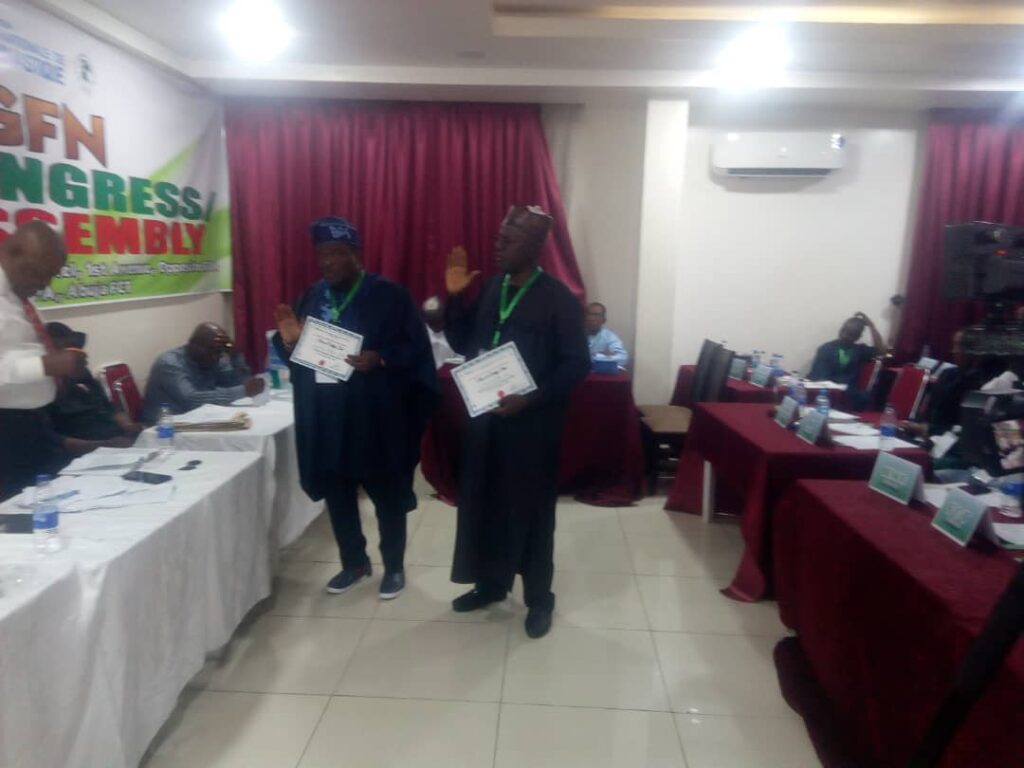Prince Erhunwmunse Re-Elected GFN President, Boston raise 20,000 gymnasts nationwide

By Andrew Abah
Prince Kelvin Erhunwmunse has been re-elected as President of the Gymnastics Federation of Nigeria (GFN) for a third consecutive term, reaffirming his status as a pivotal figure in the development of gymnastics in Nigeria and across Africa.
The election, which took place on Saturday at Gwarinpa, Abuja, was marked by transparency, peace, and broad participation.
Delegates from 32 of Nigeria’s 37 states, including the Federal Capital Territory (FCT), cast their votes under the watchful eyes of observers from the Nigeria Olympic Committee (NOC), international gymnastics bodies, and other key stakeholders.
However, representatives from the National Sports Commission (NSC) were notably absent.
Prince Kelvin won by a unanimous vote, securing all 33 votes cast, while Alhaji Mohammed Abba Inuwa emerged as the new Vice President, polling 32 votes.
Elections for board members representing Nigeria’s six geopolitical zones were also conducted successfully.
In his acceptance speech, Prince Kelvin expressed deep appreciation to the delegates for their continued trust and support.
“Eight years ago, I made a promise to take Nigerian gymnastics to new heights—from near obscurity to international recognition, including the Olympics. Many doubted it, but today, that vision has been fulfilled,” he said.
Under his leadership, Nigeria became the first West African nation to qualify for gymnastics at the Olympic Games, securing a historic gold medal and placing the country firmly on the continental and global gymnastics map.
“We’ve moved from glory to glory. Now, my focus is on strengthening club development, instilling discipline, and building robust national junior and senior teams capable of competing globally,” he stated.
In a significant move for sports development, the Federation under Prince Kelvin hosted Africa’s first-ever international gymnastics coaching course in Abuja, attracting experts from Russia, Germany, the Netherlands, South Africa, and other nations.
“They came to Nigeria because they believe in what we’re building. This has never happened before on African soil,” he added.
This international recognition has opened doors for Nigeria to receive equipment donations, training opportunities, and institutional partnerships from global gymnastics bodies.
Prince Kelvin acknowledged the challenges around equipment and facility standards but expressed optimism, citing recent engagements with the new leadership at the National Sports Commission, led by Chairman Shuaibu Dikko.
He revealed that 15 states are already being considered to receive acrobatic gymnastics equipment through partnerships facilitated by the recent international course.
The Federation’s aggressive grassroots talent hunt has also borne fruit. In Edo State alone, nearly 700 students were introduced to gymnastics, leading to the creation of over 40 new clubs. Similar programmes in the Northeast uncovered over 300 promising young athletes, many of whom competed in the Youth Games.
“We’re doing this zone by zone next is the Northwest. The goal is to raise 20,000 gymnasts nationwide, and no state will be left behind,” Prince Kelvin noted.
He praised the unity of the GFN board, noting that members have remained committed and harmonious for eight consecutive years—a rare feat in Nigerian sports administration.
Representing the Nigeria Olympic Committee, Secretary General, Tunde Popoola commended the federation for conducting a credible and constitutionally backed election.
“What you have done here today is very significant—especially for the young athletes we serve,” Popoola said.
“For many of us, gymnastics is more than a sport. It’s a passion, a calling—almost like a religion. It demands full commitment, and what we witnessed here this morning was a commendable demonstration of that dedication.”

Post Comment